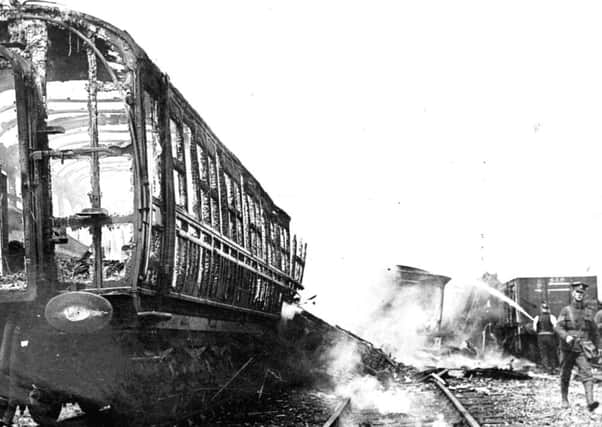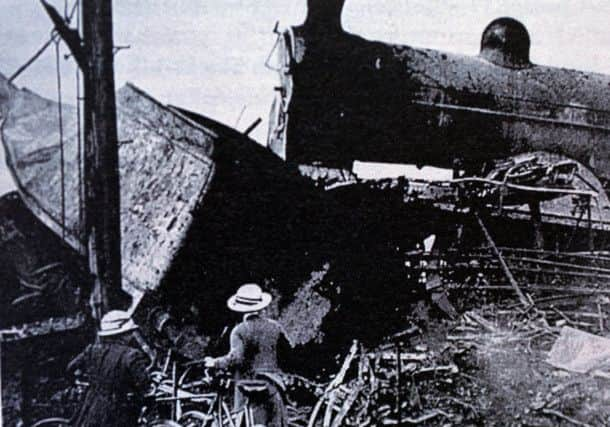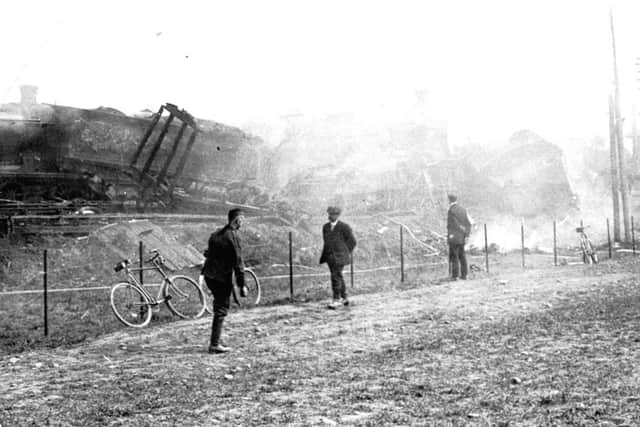Scots rail disaster at heart of WW1 commemorations


Culture Secretary Fiona Hyslop today confirmed the The Quintinshill Disaster will be among the events staged nationwide to commemorate World War I, unveiled today.
CONNECT WITH THE SCOTSMAN
• Subscribe to our daily newsletter (requires registration) and get the latest news, sport and business headlines delivered to your inbox every morning


Advertisement
Hide AdThe train crash on May 22 1915 just outside the Border town killed 216 of the Leith-based 7th Battalion The Royal Scots, Territorial Force.
They were journeying to Liverpool, prior to sailing for Gallipoli.
To this day Quintinshill remains the worst rail crash to have ever happened in the UK in terms of loss of life.


Ms Hyslop said: “Throughout 2015 – the busiest year in Scotland’s five-year commemorations programme – we will continue to encourage people in all parts of Scotland to join with us to consider the impact of the First World War, which claimed the lives of more than 100,000 Scots and left many more injured or disabled.
“The Quintinshill Rail Disaster, Gallipoli campaign and Battle of Loos each had a profound and long-lasting impact on Scotland and it is right that we pause to remember each event, and the Scottish communities who were affected.
“The First World War had a significant and broad impact on our nation. Through our national commemorations the people of Scotland will have opportunities to reflect on its lasting social and civic legacy.”
Advertisement
Hide AdEvents in Gretna and Leith in Edinburgh will mark the centenary of the Quintshill disaster on May 22 and 23.
Other events will see Stirling host a national commemoration on June 4 and 6 to mark the 100-year anniversary of the date the 52nd (Lowland) Infantry Division arrived in Gallipoli after training in the city.
Advertisement
Hide AdThe division, including many Scottish battalions, landed on the Gallipoli peninsula on June 4 to take part in the allied naval and military operation to force the Dardanelles which aimed to secure entry to the Black Sea and to the then capital of Turkey, Istanbul.
On September 26, Dundee will host a national event to commemorate the centenary of the start of the Battle of Loos, in which around 30,000 Scots fought. Battalions from every Scottish regiment fought in the Battle of Loos and suffered huge numbers of casualties. Of the 21,000 killed, over 7,000 were Scottish soldiers. Almost every town and village in Scotland was affected by the losses at Loos. Six Battalions of the Black Watch, mostly drawn from Dundee and its surrounding counties, took part.
The 4th Black Watch, “Dundee’s Own”, suffered huge losses with 57 per cent of men killed or wounded on the first day of battle.
Norman Drummond, chair of the Scottish Commemorations Panel, said: “2015 will be the busiest year in Scotland’s commemorations, and we will further pause to reflect on the horror of war, the service and sacrifice of our servicemen and women and of those at home, and the lessons we continue to learn.”
SCOTSMAN TABLET AND IPHONE APPS